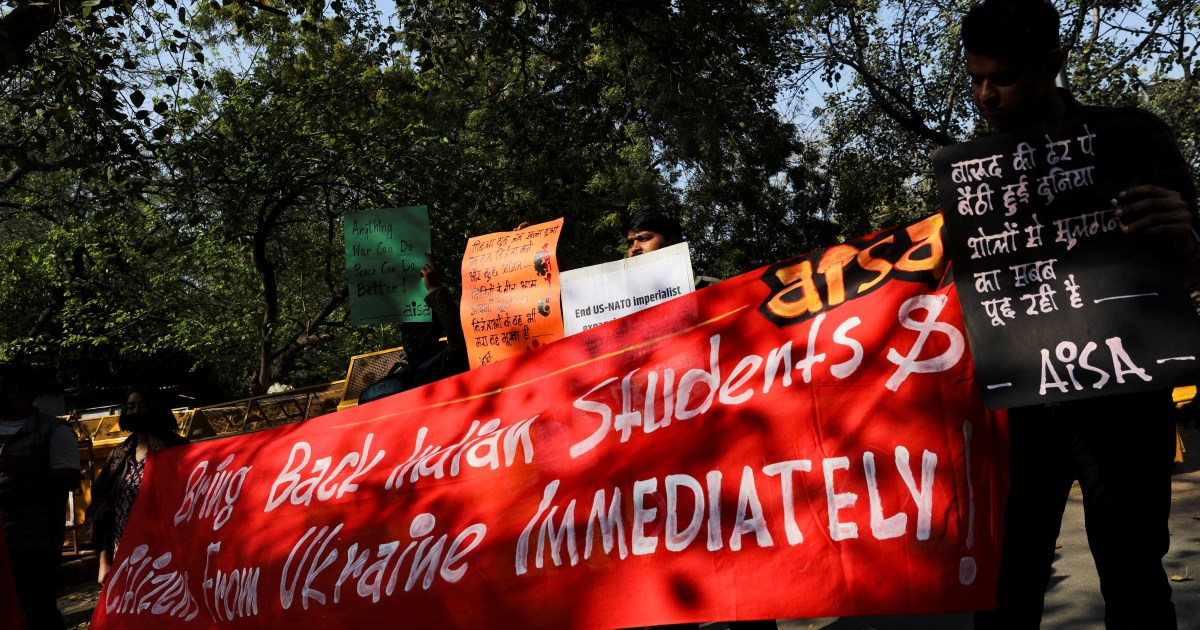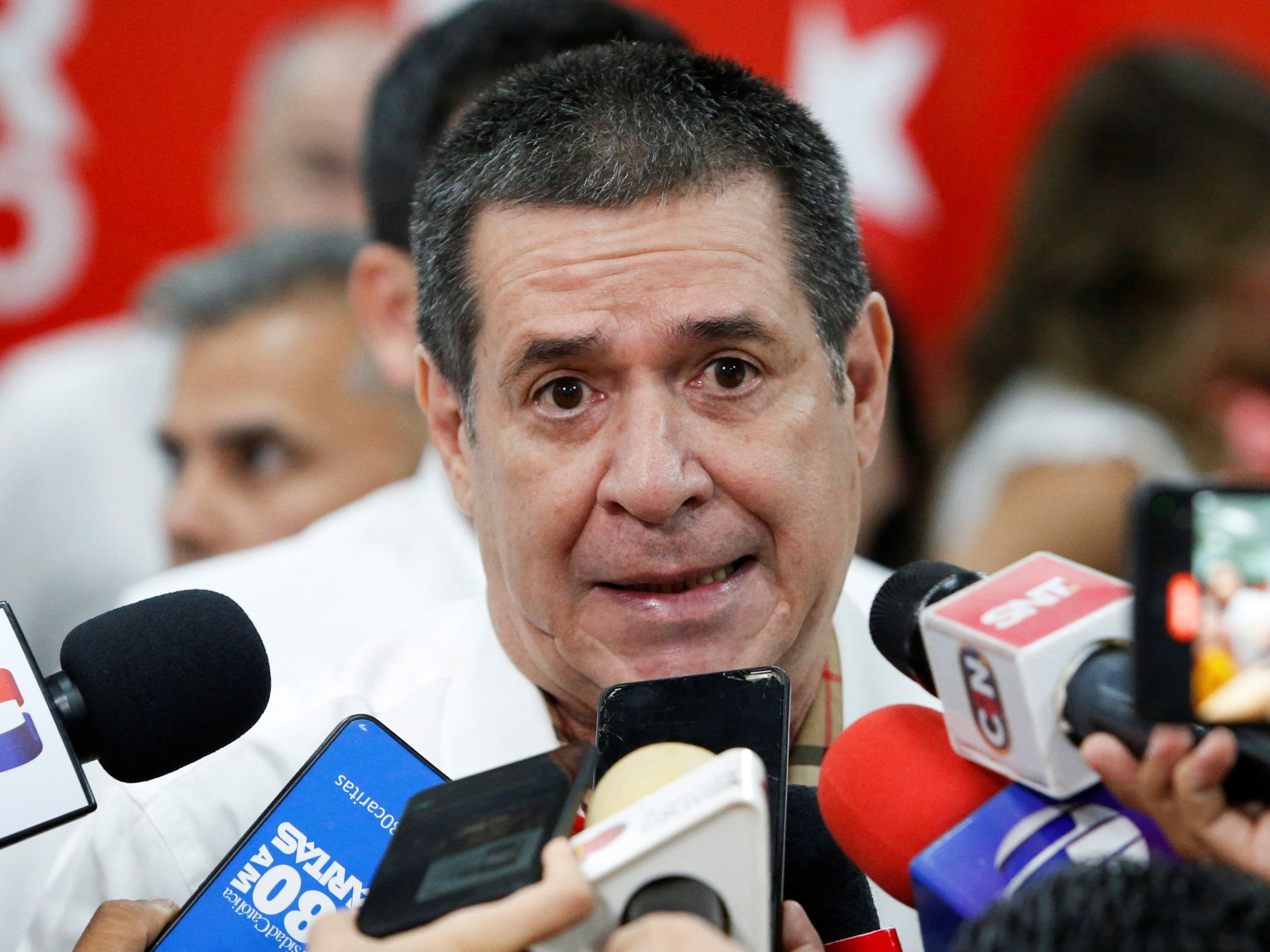Putin, Modi discuss plight of Indian students trapped in Ukraine
Russian President Vladimir Putin has held talks with India’s Prime Minister Narendra Modi on the urgent evacuation of Indian students trapped in the Ukrainian city of Kharkiv, the Kremlin says.
During their video call on Wednesday, Putin said he had ordered Russian soldiers “to ensure the safe exit of Indian nationals from the armed conflict zone and their return to their homeland,” according to a Kremlin statement.
Russia was trying to organise the emergency evacuation of a group of Indian students from Kharkiv via a humanitarian corridor, it added.

On Wednesday, the Ukrainian authorities said Russian paratroopers had landed in the eastern city, and that there was fighting in the streets.
India denies students taken hostage
Meanwhile, Russia’s defence ministry on Wednesday said the Ukrainian authorities were holding a group of Indian students by force.
“They have practically been taken hostage,” ministry spokesperson Igor Konashenkov said during a televised briefing.
But Indian media reports on Thursday said New Delhi has denied reports of its students being held as hostages in Ukraine. India’s foreign ministry said it was in constant touch with Indian nationals in Ukraine, reports added.
“We have not received reports of any hostage situation regarding any student. We have requested support of the Ukrainian authorities in arranging special trains for taking out students from Kharkiv and neighbouring areas to the western part of the country,” India’s foreign ministry spokesperson Arindam Bagchi said.
Russian defence ministry spokesperson Konashenkov said Ukraine was offering to evacuate the Indian students via the western border with Poland, which, he said, would mean they would be passing through combat zones.
“The Russian armed forces are ready to take all necessary measures for the safe evacuation of Indian nationals” so they can be flown home from Russia, he added.
New Delhi announced on Tuesday that an Indian student had been killed during shelling of the eastern Ukrainian city of Kharkiv. Russian artillery bombardment of the city killed 21 people there on Tuesday, said the region’s governor.
India is trying to arrange the safe evacuation of some 12,000 of its citizens.
Before Russia launched its invasion of Ukraine last Thursday, there were 20,000 Indians in Ukraine.
Since then, however, about 8,000 have managed to leave the country, and about 1,400 of them have already been repatriated, said Indian authorities.
India abstains from UNGA vote
Also on Wednesday, India abstained from voting at a landmark United Nations General Assembly (UNGA) which overwhelmingly adopted a resolution asking Russia to “immediately” withdraw from Ukraine.
After more than two days of extraordinary debate, which saw the Ukrainian ambassador accuse Russia of genocide, 141 out of 193 UN member states voted for the non-binding resolution.
India and China were among the 35 countries which abstained, while just five – Eritrea, North Korea, Syria, Belarus and of course Russia – voted against the resolution.
India is yet to criticise longstanding arms supplier Russia publicly, instead urging both sides to cease hostilities, causing frustration among its other allies including the United States.

But pressure on Modi’s government to condemn old friend Russia’s invasion of Ukraine has been growing since the killing of the Indian student in Kharkiv.
“The Government of India should stop its verbal balancing act and sternly demand that Russia stop immediately the bombing of key cities in Ukraine,” P Chidambaram, a parliamentarian from the opposition Congress party, said in a tweet on Tuesday.
In a statement the same day, India’s foreign ministry said Prime Minister Modi “stressed upon the importance of respecting the sovereignty and territorial integrity of nations” during a call with Polish President Andrzej Duda.
Russia has long supported India internationally on critical issues including Kashmir, a territory disputed between India, Pakistan and China, as well as provided the bulk of its military capability.
New Delhi has for decades attempted to lessen its reliance on Russian-made weapons, while keeping the relationship close enough to avoid Moscow aligning more with rival Asian power China.
“India is increasingly uncomfortable with the position that Russia has taken, but it is very difficult for it to voice it in public,” said Harsh Pant, a defence and geopolitical analyst at the New Delhi-based Observer Research Foundation.
Some 60 percent of India’s military hardware is still Russian-made, Pant said, and a relationship with Moscow is essential to maintain equipment and source spare parts.




